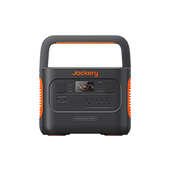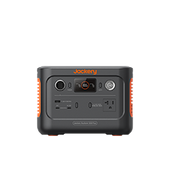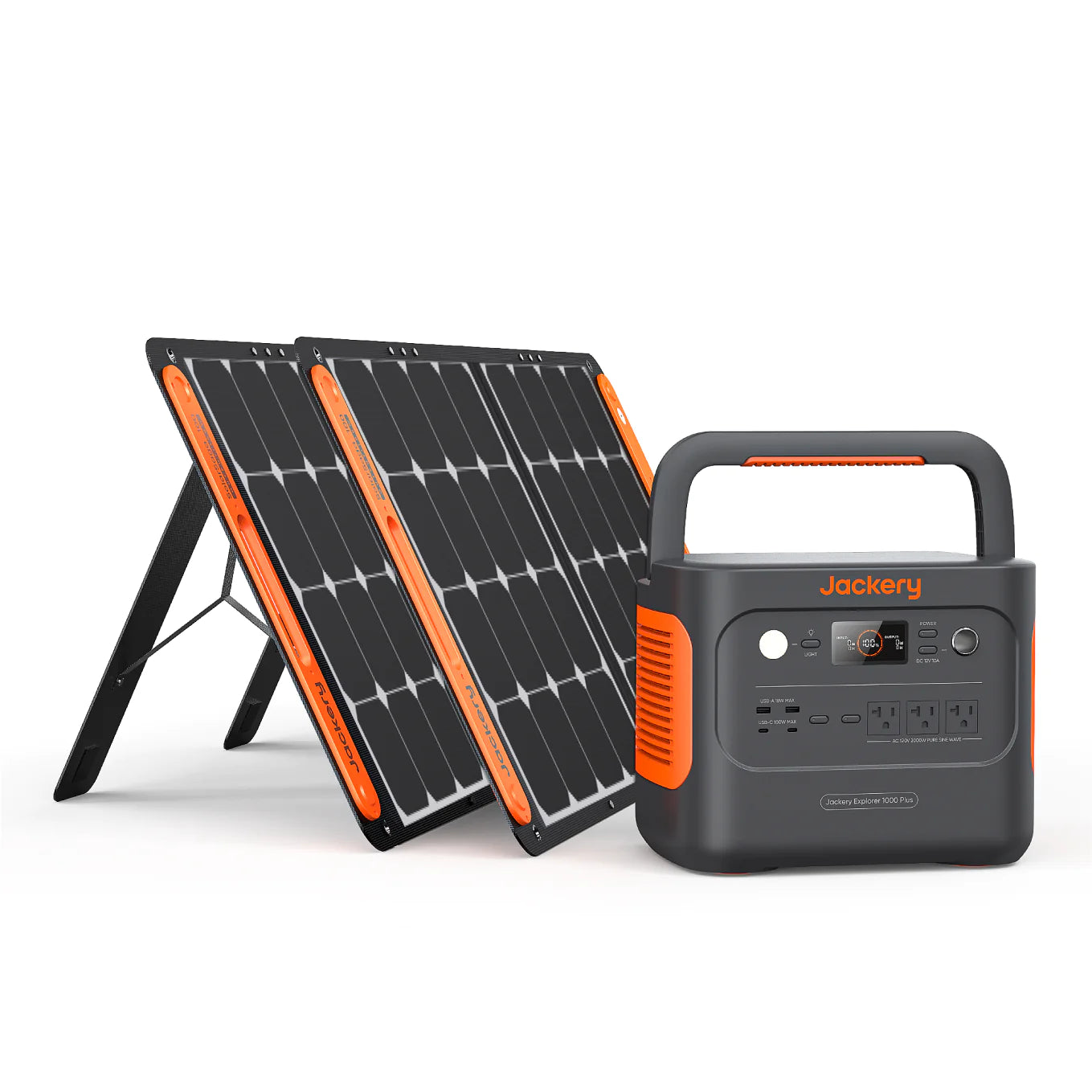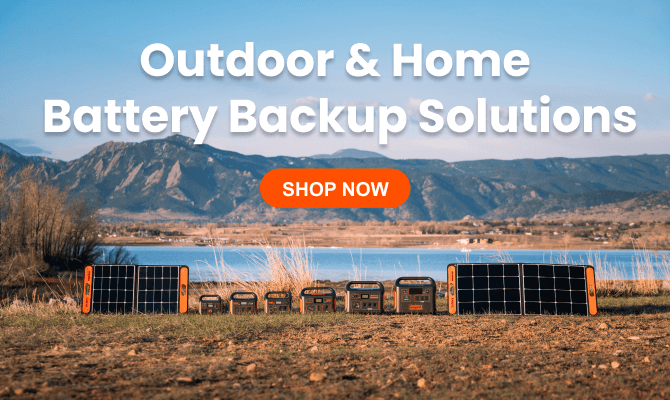CPAP is a popular therapy for sleep apnea, but powering the appliance during power outages or outdoor adventures can be a hassle. A CPAP power supply is ideal for charging the CPAP machines during unexpected power outages, when living off the grid, when camping, when RVing, etc. The portable solar generators are great charging solutions that can charge CPAP machines throughout the night, ensuring sound and peaceful sleep.
You don't have to forgo off-grid experiences just because you or a loved one utilizes a CPAP! Solar energy is undoubtedly a wise option for running your CPAP, particularly solar generators, which are more hygienic and quiet than batteries. Jackery solar generators are appropriate for your CPAP and come in various sizes. You will discover what CPAP is, CPAP power supply, and its types on this page.
How Many Watts Does A CPAP Use
Depending on the brand and model of your CPAP machine and the comfort features you have turned on. You may need a different quantity of power. A CPAP machine typically consumes 30 to 60 watts without a heated humidifier at a usual pressure level of 7 to 12 cm H2O. The power consumption of CPAP machines can reach 70–100 watts when heated humidifiers are used in higher-pressure settings. Although most models only offer waterless humidification, travel CPAP machines are significantly more efficient and usually provide therapy for just 5 to 20 watts.
How Much Power Does A CPAP Need
If you need help determining how much power your device consumes, consult the owner's manual or contact the maker. By dividing the operating wattage by the voltage of your machine, you can also determine its amp draw.
A 24-volt CPAP, for instance, might have an average power demand of 53 watts and a maximum draw of 104 watts. A typical power draw of 2.2 amps equals 53 Watts divided by 24 Volts. The highest power draw for 103 Watts is 4.29 amps when divided by 24 Volts. Of course, you'll also need to know the power requirements of any additional appliances used concurrently. You're fine if you don't use more power than your system's 30 or 50-amp limit draw.
How Many Watts Does A ResMed AirSense 10 Use?
ResMed AirSense 10 CPAP requires around 90W power supply. On the other hand, the newer AirSense 11's CPAP wattage is around 65W.
How Much Power Does A CPAP Use In 8 Hours
On average, the CPAP machine power usage is around 40W of electricity per hour. If you are running a CPAP machine for 8 hours, it will typically consume around 40W × 8H = 320Wh.
How Many Watts Does A ResMed AirSense 10 Use?
ResMed AirSense 10 CPAP requires around 90W power supply. On the other hand, the newer AirSense 11's CPAP wattage is around 65W.
How Much Power Does A CPAP Use In 8 Hours
On average, the CPAP machine power usage is around 40W of electricity per hour. If you are running a CPAP machine for 8 hours, it will typically consume around 40W × 8H = 320Wh.
CPAP Power Supply
The CPAP power supply, also called the CPAP power solution, must continuously supply power to the CPAP to function correctly. Virtually all CPAP machines use a power source plugged into an electrical outlet. Take your therapy when you travel, though, and ensure you're rested and prepared to appreciate your adventure!
For CPAP machines, numerous power options are available, allowing you to treat your sleep disorder at home or abroad successfully. Bringing AC power cords, portable battery packs, DC power cords, and solar generators is ideal for sleeping under the stars or away from fixed power sources.
There are four types of CPAP power supply.
Types of CPAP Power Supply
A CPAP machine needs continuous, steady, and quiet energy to operate, which can come from electricity, batteries, or another kind of power source.
- Inverter: An AC electricity at 120 volts is the most typical way to power your CPAP machine. You will require an inverter to power the wall outlet that your machine is connected to when using a 120-volt service. The inverter converts your 12-volt battery's power to 120 volts, and it needs enough wattage to supply the device with the proper quantity of electricity.
- Direct Current: Using direct current is a different choice (DC). This approach involves wiring a 12-volt outlet in your house or RV to use a DC cable for electricity, though it is less complex. The outlet must be installed in line with the electrical requirements of your particular RV. They are similar to cigarette lighter receptacles and can be bought from Amazon or an auto parts shop, but you'll need to have the right size wire and fuse.
- Battery Pack: The third and least popular option is to use a portable battery pack to power the CPAP machine. The battery pack must be designed especially for your machine. They are available for buy on Amazon and other retailers. The CPAP machine's battery pack or portable power source typically has enough power to run for two nights.
- Solar Generator: Solar generators combine power stations with solar panels. Solar panels convert solar energy into electrical energy, then stored in power plants for subsequent use. The generator technique helps recharge your battery bank and has no adverse effects on your batteries. Additionally, compared to other battery or generator kinds, the solar generator is quieter, cleaner, and simpler to use.
|
Types |
Pros |
Cons |
|
Inverter |
- Common option in RV or camping - Cheaper |
- Requires plug-in 12V outlet - Requires 12V battery - Efficiency decrease - Only the inverter can not power |
|
Direct Current |
- Less complex - Easily connects to the grid |
- Needs correct size wire and fuse - Needs DC cable - Hard to operate when off the grid -Not Portable |
|
Battery Pack |
- Portable - Easy to use |
- Need to match your CPAP - Only support short-time use |
|
Solar Generator |
- Renewable Power - Lightweight, portable - Quiet - Power even at night with its portable power station fully charged - Pass-through charging - Multiple outlets or ports - Combine solar panels with power stations - No maintenance costs - Off grid, power outage backup power |
- A little pricey |
Can A Solar Generator Power A CPAP
The answer is yes! A solar generator is ideal for CPAP power supply, especially when you are camping, living off the grid, home power outage. You will never go wrong with Jackery if you seek the best solar generator for a CPAP. It combines the portable power station with SolarSaga solar panels, which absorb solar energy and turn it into electricity.

A quiet solar generator or portable power source works best for a CPAP machine. This is why it is wise to choose solar generators over conventional generators. Jackery provides a range of solar power generators, depending on the number of appliances you need to run and your power requirements. Since a CPAP only requires 30 to 60 watts of electricity, the Jackery Solar Generator 1000 Plus or Solar Generator 500 are highly recommended because they are portable, quiet, and affordable.
Please note that actual runtime may vary; the information below is for reference purposes only.
|
Product |
Running Time of CPAP Power Supply (CPAP = 40W) |
|
Jackery Solar Generator 500 |
8.5H |
|
Jackery Solar Generator 600 Plus |
10.4H |
|
Jackery Solar Generator 1000 v2 |
16.0H |
|
Jackery Solar Generator 1000 Plus |
18.2H |
|
Jackery Solar Generator 2000 Plus |
25.8H |
|
Jackery Solar Generator 3000 Pro |
38.1H |
CPAP Camping Power Supply
One option to power CPAP during camping trips is to take a portable solar generator to the campsite. While traveling, the Jackery Solar Generator 1000 Plus and Jackery Solar Generator 500 are excellent choices as CPAP batteries for camping. A continuous power supply for your CPAP device is guaranteed even on multi-night camping trips, thanks to the solar panels available. These generators are ideal for use in various camping spots thanks to their lightweight, foldable design and clean, quiet operation.

CPAP Backup Power Supply
It is still advised to have a secondary CPAP battery even if you don't enjoy hiking, camping, or living off the grid. Some CPAP batteries have a fallback function that activates during an unexpected power outage. A solar generator converts solar energy into electricity and stores it in a power station, so you never have to fear a power outage. Concerning the Jackery Solar Generator 2000 Plus, it can be fully charged in just 2 hours thanks to 6 units of ground-breaking SolarSaga 200W solar panels. You can experience limitless green power wherever you go with a quick and easy 60-second setup.

CPAP RV Power Supply
Using a CPAP machine in an RV is very simple if you plan on a powered campsite. If the RV campground does not offer access to electricity, you can use a portable solar generator to plug in your CPAP. Using a generator is one of the easiest ways to power your CPAP machine while spending the night outdoors or in an RV. This independent electrical supply offers a steady flow of electricity to run your CPAP machine all night. The Jackery Solar Generator 600 Plus is a lightweight, durable, and powerful CPAP power supply for RV. It weighs just 16.1 lbs and can be easily stored in an RV to charge various appliances.

CPAP Off-Grid Power Supply
If you're living completely off-grid without access to on-grid power, you'll need a large solar generator. The Jackery Solar Generator 3000 Pro has a large battery capacity that supports 99% of your home or outdoor appliances. With the large CPAP generator, you can keep home appliances to ensure essential appliances such as CPAPs, refrigerators, air conditioners, televisions, space heaters, etc., are charged.
Uninterruptible Power Supply for CPAP
The Jackery Solar Generator 1000 v2 features a UPS system that ensures seamless power switching for CPAP machines. It has a response time of less than 20 milliseconds to offer continuous operation of essential devices during voltage fluctuations and power outages. Additionally, the solar generator for CPAP machines is lightweight, robust, and durable to ensure you're left without power anytime. It's an ideal charging solution for charging essential appliances like CPAP machines during brownouts or blackouts.
How to Choose A CPAP Power Supply
The majority of CPAP machines available are AC-powered. Therefore, it might be challenging when there is no power or when you are traveling. You can use backup batteries, solar generators, or other generators as a CPAP power source to alleviate such a situation. The following factors should be taken into account when selecting a CPAP power supply:
- Power Capacity: In addition to battery capacity, a CPAP battery's power output capability should also be carefully considered. Whether or not your battery can run your CPAP depends on its power capacity. For instance, if your cell has a power capacity of 50W but your CPAP demands 55W, the battery will not be able to power it.
- Battery Capacity: How long the battery can fuel your CPAP device depends on the battery's capacity. Assume your battery has 500Wh (Jackery Solar Generator 500 has a battery of 518 Wh) and your CPAP device needs 50W of electricity. In this scenario, your battery can constantly power your CPAP for 7-8 hours.
- Portability: The battery's mobility is the third and final factor to consider. Traveling already involves a lot of lifting; adding more baggage could only worsen the situation.
- Quiet:At near noiseless operation, the working volume of Jackery Solar Generator 1000 Plus is as low as 30dB - more modest than a library (40dB). And the Solar Generator 500 produces less than 37.9dB: a quiet generator for camping or RV is one of your best outdoor living investments.
- Safe: The solar generator does not emit any polluting fumes, whilst producing renewable energy. Safe solar energy for both outdoors and indoors.
CPAP Power Supply FAQs
The following shows the frequently asked questions about the CPAP power supply:
1. Is it worth using a solar generator for CPAP power supply?
A CPAP system can indeed be powered by solar energy. For apparent reasons, a solar generator won't produce any noise like a traditional fuel-powered generator would. A solar generator has no moving parts, so the only noise you might notice is coming from the inverter. Once you are in an area with an ideal quantity of sunlight, you have an endless energy supply.
2. What Size Solar Generator Do I Need to Run An AC?
Watt-hours are a method to estimate how much time you'll spend using your device each day. It also determines how much energy you'll use. The number of hours your CPAP will run should be multiplied by the roughly 50 watts it consumes. For illustration, 50 times 8 equals 400 watt-hours. In general, purchasing a solar generator that can meet your requirements, like Jackery, is advised.
3. What to consider when buying a CPAP power supply?
There are many things to think about when purchasing a CPAP power supply. In addition to power capability, battery capacity, and portability, other factors include machine compatibility, run time, charge time, cost, warranty, and warranty. The battery you select must, above all, work with your CPAP equipment.
4. How many amps does a ResMed CPAP use?
The average electricity consumed by ResMed CPAP is around 53 - 104 watts. When operated at 24V, the average amps drawn will be around 2.2 - 4.2 amps. It can be calculated using the simple formula: Amps = Watts ÷ Volts.
5. How to use CPAP when power is out?
A solar generator is one of the best options to run CPAP during power outages. Jackery can power CPAP or BiPAP during short or extended power outages. For example, the Jackery Solar Generator 1000 v2 is ideal for charging CPAPs for uninterruptible power supply.
Final Thoughts
It's crucial to make the correct purchase choice when purchasing a CPAP power supply. Because CPAP power supplies are expensive, you should spend your money on one that will last and is suitable for your particular CPAP machine. Solar generators are known for their clean energy, portability, low upkeep, and quiet charging. Your best option for a CPAP power supply to allow a cozy night might be Jackery!






















































































































Leave a comment